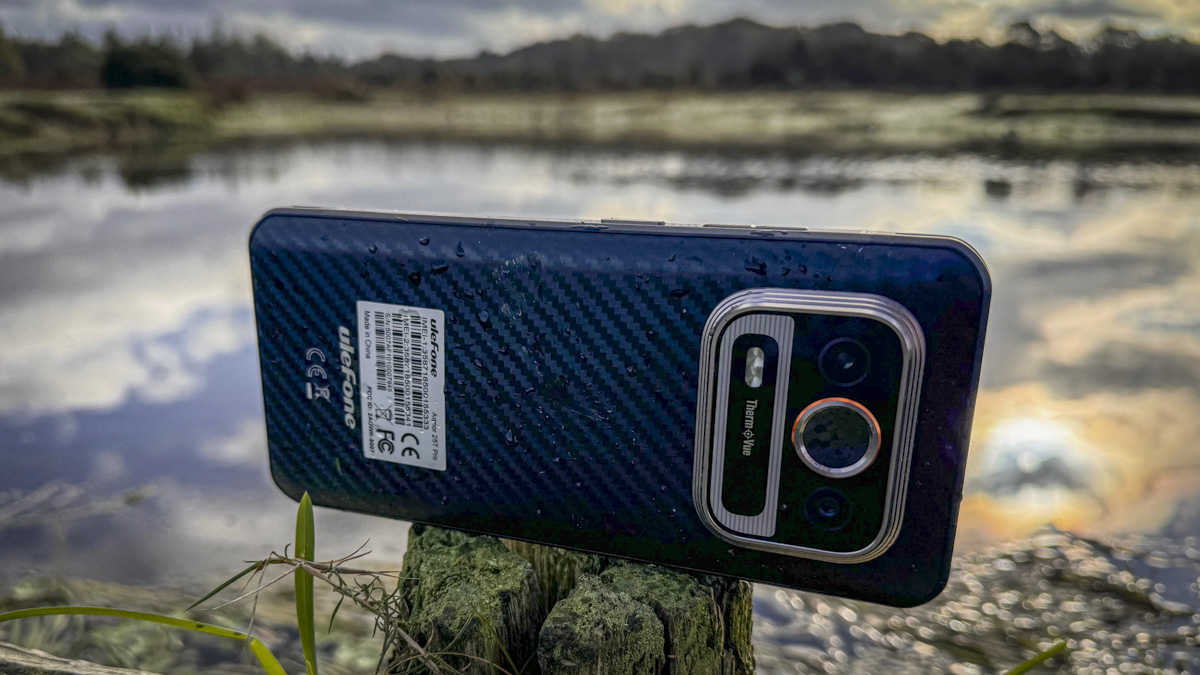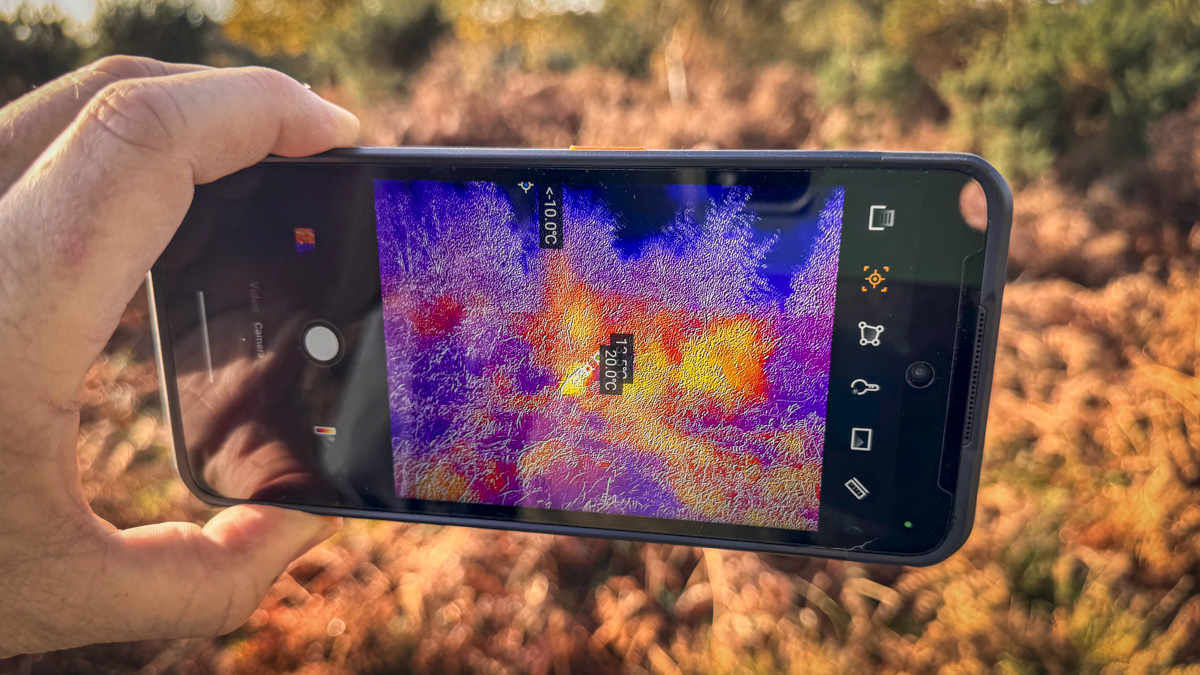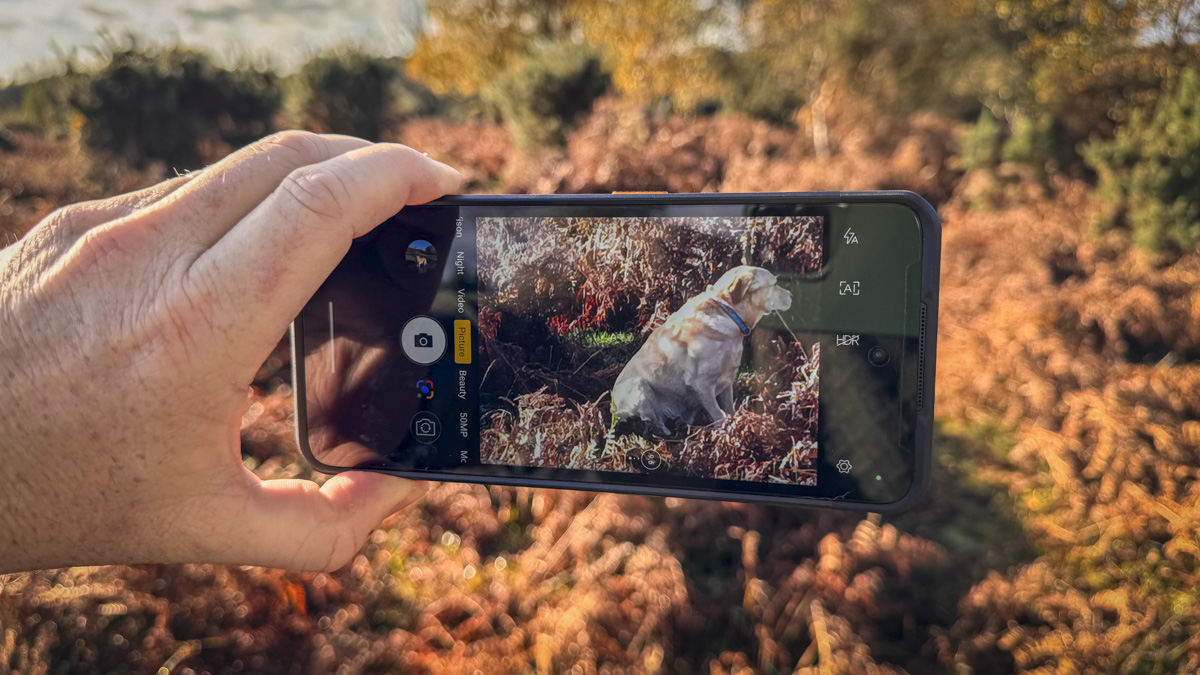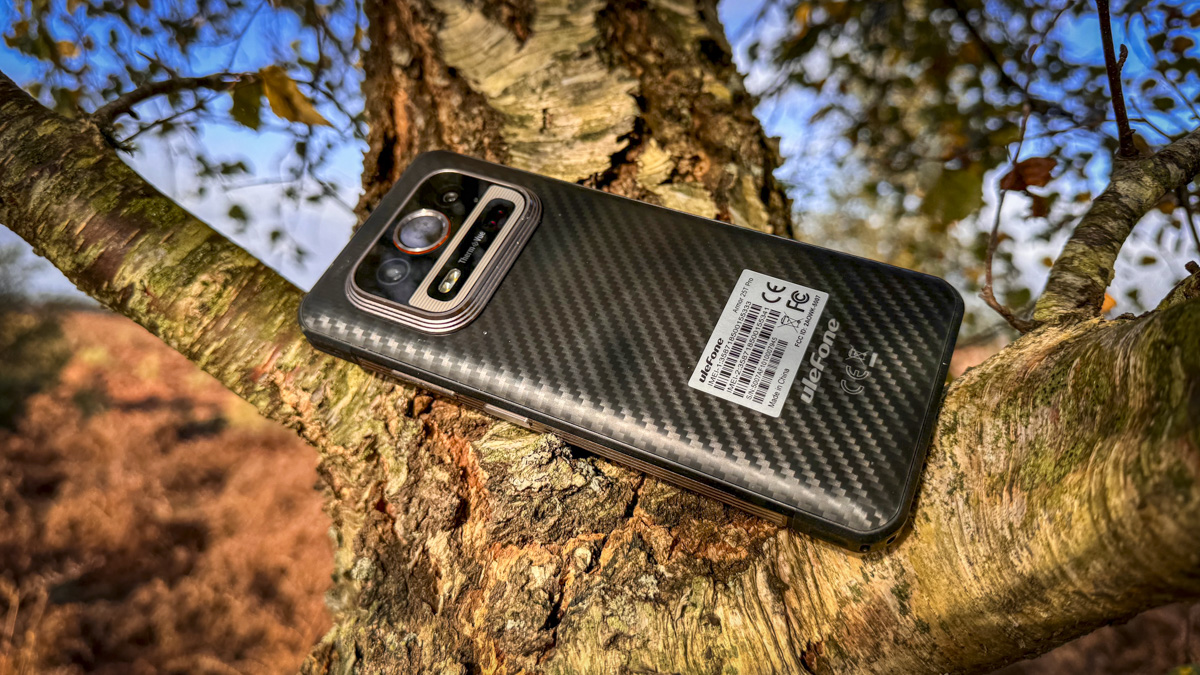
Ulefone Armor 25T Pro: 30-second review
The Armor 25T Pro has been designed for outdoor and trade use rather than for general consumers. The phone boasts all the usual rugged credentials and can withstand more than just a few knocks, protected by its aluminium-titanium frame that ensures durability. With an IP68 certification, the phone is fully waterproof, and even features military standard certification.
The standout features of the Armor 25T Pro is its thermal imaging camera, which many trades will find useful. Whether you're a motor mechanic diagnosing a mechanical issue or an electrician or plummer detecting heat signatures the builtin thermal camera should prove invaluable.
Alongside the thermal camera, the phone features a decent 50-megapixel main camera and while this may not rival camera phones such as the iPhone 16 Pro, it's more than adequate for site documentation or capturing a few shots.
However it's the 64-megapixel night camera, that like the thermal camera will appeal to trade working in dark environments. This camera will enable the capture of images in enviroments where light would usually make taking photos restrictive.
Unlike many of the best rugged phones I've tried out, however, that have upgraded to Android 15, the Armor 20 5T Pro still runs on Android 14, which is dated and could potentially lead to a few app compatibility issues. Then there's the processing power which while fine for everyday tasks is pushed for anything to intensive.
If you work outdoors or in a trade and need to detect heat signatures then this is a great choice, with its rugged and slimline design supporting that thermal camera, otherwise, if you don't need the thermal camera, there are plenty of more powerful smartphones out there for a similar or cheaper price.
Ulefone Armor 25T Pro: Price & availability

- How much does it cost? Starting from $499?
- When is it out? Available now
- Where can you get it? Direct from Ulefone
Widely available for $499 through the Ulefone website, as well as directly through Amazon and other online retailers.
- Value: 4 / 5
Ulefone Armor 25T Pro: Specifications
Ulefone Armor 25T Pro: Design

The first thing that strikes you about the Armor 25T Pro is the large 6.78-inch screen that dominates the front. What's surprising is that, despite being rugged, the phone is relatively slimline, making it resemble a standard consumer phone more than other models in the Armor range. Measuring 177.4 mm x 12.5 mm x 81.4 mm, it's a little wider than an iPhone and about an inch taller. At 326 g, it's also slightly heavier than a standard consumer phone, but not excessively so.
One of the key reasons to opt for an Armor phone is its durability, and the build of the phone sees a mix of aluminium and titanium alloy for the frame. This makes it extremely durabile and this robust build is backed by certifications including IP68/IP69K and MIL-STD-810H, essentially ensuring it can handle drops into water or onto the ground. The screen is protected by Gorilla Glass Victus which should make it relatively resistant to scratches and breaks.

When it comes to the cameras; there's a 50-megapixel main camera, a 64-megapixel night camera, and the thermal camera. On the front, a selfie camera supports video conferencing.
Looking around the device, the right side of the case houses the volume buttons and the power button. On the left, there's a dual SIM card slot that can hold up to two sim cards with an addition space for a MicroSD, which is useful when switching between network areas. Below this, there's a customisable button highlighted in orange. At the top of the phone, you'll find a 3.5 mm audio jack, while the bottom has a USB-C port for data transfer and charging.
The overall design feels sturdy and the large screen is useful in outdoor settings, offering excellent brightness and visibility in almost all weather conditions. If you need a phone for that is rugged the Armor 25T Pro's design and features make it a great choice, offering a rugged build that is similar in size to a standard consumer phone.
- Design: 4 / 5
Ulefone Armor 25T Pro: Features

- 6500mAh battery
- IP68/IP69K and MIL-STD-810H certification
Several features make the Armour 25T Pro really stand out. At the top of the list is the Thermal Imaging camera, which has a thermal resolution of 160 x 120, a refresh rate of 25 Hz, and can pick up heat signatures between -10°C and 550°C with a ±3°C accuracy. Essentially, using the Thermal View software app that comes pre-installed on the phone, you can load it up and instantly get a thermal imaging picture of the scene in front of you.
Alongside the thermal imaging camera, you also have the 50MP Main Camera, which is a Samsung S5KGN1 sensor, and this is fronted by a seven-piece lens with an 85° field of view and a large f/1.95 aperture. It also features electronic image stabilisation, making it a perfect all-round option for capturing images.
Next to this, you have the 64MP night vision camera. This is an OV64B1B sensor with a large f/1.79 aperture and can take images up to 6912 x 9216 pixels, whereas the video resolution is 2K.
For use with both of these cameras is the dual LED flash, so even if the conditions are dark, you've got plenty of ways to illuminate what's ahead of you.
One of the features which will really appeal to anyone working in a trade is the fact that through the camera interface, you can add things like location info and even brand watermarks. So, if your company is taking a photograph of a worksite, you can send those images on, and they will be pre-branded with your logo.
There are a few other really nice features, including the fact that this phone features a 5G chipset. When it comes to making calls out on-site, the connection should be robust, while internet connection speeds should be nice and quick.
When it comes to power the phone features a massive 6,500mAh battery, which supports 33W fast charging and 30W wireless charging. This battery essentially gives you a standby time of 487 hours and a talk time of up to 48 hours, far more than you usually expect with a consumer phone.
Taking a look at the processing inside the phone and we've got a MediaTek Dimensity 6300 with 5G. This features a CPU with two Cortex-A76 and six Cortex-A55 cores, along with an ARM Mali-G57 MC2 GPU, which is common with this type of device. The CPU and GPU are backed by 6GB of LPDDR4X RAM and 256GB of phone storage, and this can be increased with a microSD or TF card up to 2TB.
The large 6.78-inch screen features IPS technology with a maximum resolution of 1080 x 2460, so Full HD, and 396 PPI with a refresh rate of 120 Hz. As you would expect, this features a punch-hole display, and the front-facing camera is a 32MP Samsung GD1 sensor with a five-piece lens, a field of view of 80.4°, and an f/2.45 aperture—perfect for taking selfies or for a bit of video conferencing.
Some of the other noticeable features include the fact that it runs on Android 14, has NFC, as you'd expect, and an IR blaster, which could be used alongside relevant apps.
- Features: 3.5 / 5
Ulefone Armor 25T Pro: Performance

- Thermal Camera
- Robust and waterproof
The Armour 25T Pro blends the boundary between consumer and rugged phone with a sight on a trade customer base. Firstly supporting this is the design of the phone, with its slim profile making it perfectly pocketable. While it is a little bit heavier than your average phone, it isn't overly so. It also features a big display, which is viewable in relatively bright conditions, and is a great viewing screen for watching back videos, as well as conducting conference calls.
Through the test, I used a Vodafone 5G SIM, and the overall reception in areas where there's generally very little reception was in line with other consumer smartphones, including the iPhone 15 Pro; although the signal was slightly stronger, likewise in the city the 5G signal provided decent connection speeds.
The system runs on a slightly older version of Android 14, so all apps that we tried to run were a little bit slower than we've noticed with the latest Android smartphones, and some took longer to load, however, once loaded they generally worked well enough. Through the test, I used the Google suite of office applications, including Google Docs, and these opened relatively quickly utilising the cellular network. What was nice here is that the large screen made those apps quite usable, with the screen keyboard being just large enough to actually use effectively to type up notes.
Watching back a Netflix show or two proved that there was enough processing graphics power here to run back media without any issue at all. However, I should highlight that the speakers while OK, are quiet, and using the 3.5 mm jack, or BlueTooth connection with some headphones is advisable.
What really makes the phone Armour 25T Pro stand out is, the thermal imaging camera, and this is powered by ThermoVue app, which is pre-installed when you purchase the phone. Getting started with the App is relatively straightforward, and you have plenty of options over the way that the visuals are displayed on the screen, with different colour schemes. Along with the visual aesthetics of the on-screen coloured overlays, you also have useful information, such as temperature. The app itself does take time to load, and if you switch to another app and then back to the thermal app, I did experience some instability.
As you move the camera around, the preview does stutter, but it generally keeps up, showing the signatures of every item in the scene and the relevant temperatures. When it comes to trade, there are plenty of applications where this app will come in use.
For example, if you have some heating piping and want to get the temperatures, you can tap for a single reading or draw a box around the piping for an average. For the average reading the app will measure the temperatures within that box, giving you the maximum, minimum and average temperature. You can also highlight up to three points to gain different targeted temperature readings.
The real-world application of this thermal camera for trade is huge. It will be a useful tool alongside other monitoring and measurement equipment for locating heat signatures in everything from automotive cooling systems to electrical wiring and water systems within buildings. While the system can't see directly through walls, those pipes will have a heat signature that the camera will pick up. Through the test I was able to see hot water piping as it went under the floor through to one of the downstairs bathrooms, something that isn't visually visible in normal conditions.
Alongside the thermal camera, you also have the fact that this phone is robust, albeit with a slimline design. Through the test, I submerged it in a fast-flowing stream for half an hour before dropping it from a height of 2 m onto a concrete floor. In both situations after a bit of a dry down and clean off, the phone continue to work without issue.
While this phone might be a little bit on the large side for general day-to-day use, when it comes to trade, that size and the fact that it has a thermal camera built-in will make it a great option for many people.







- Performance: 3.5 / 5
Ulefone Armor 25T Pro: Final verdict
While this phone might be a little large for general day-to-day use when it comes to trade professionals, the size shouldn't be an issue, and the fact that it features a built-in thermal camera can only make it a major asset.
That integrated thermal camera essentially eliminates the need for a separate device or one that plugs into your smartphone, which means that it will inevitably always be with you, so you're much more likely to use it. Then there are the main and night cameras, perfect for documenting sites and work.
Alongside the various imaging capabilities, the processing power, while not overwhelming, is sufficient for day-to-day tasks, essentially browsing the internet and viewing documents.
While some of the features won't appeal to the general consumer market, for trade and business use, the thermal camera and the rugged build make it an excellent asset for a wide range of uses.
Should you buy a Ulefone Armor 25T Pro?

Buy it if...
Don't buy it if...
For more durable devices, we've tested and reviewed the best rugged tablets, the best rugged laptops, and the best rugged hard drives







